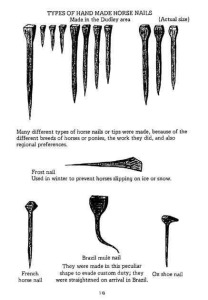Minnie Frisby (b. 1877): Life and Labour
Alongside childhood, working life and labour is a significant theme in Memories.

After discovering Minnie’s maiden name through her marriage onI was able to locate the entire Jones family in the 1881 Census.
Here, Minnie’s father Joseph Jones’ occupation is noted as a ‘Nailer’. Minnie’s mother Ann remains unemployed however, Minnie recalls both parents working, ‘we had a nail shop, both my mother and father made nails there.’ (Frisby, I:1) Nail making was popular in the Birmingham area due to the availability of iron and coal, however, it was plagued by striking.
Along with industrial work Minnie’s family were farmers and grew watercress. They inhabited two houses in Bromsgrove clearly highlighting their respectability as a working class family.
Minnie recalls how, ‘people used to come for miles to buy our cress and they are still living today.’ (Frisby, I:7) Again, watercress growing was popular around Birmingham due to its medicinal properties. Watercress contains Vitamin C, Calcium, Iron and Folate all of which are important to healthy development. Therefore, people would come to the Jones’ for the cress to cure their ailments.
Due to the variety of work that the Jones’ completed, Minnie is fortunate as she does not mention unemployment. This shows the respectability of the family and their drive to succeed.
Interestingly it is her father that Minnie puts on a pedestal, even though Minnie recalls her mother working as a herbalist, ‘Nailer’, midwife and farmer. Minnie writes, ‘my mother was in great demand as a midwife… I believe her fee was 2/6.’ (Frisby, II:6) Therefore, although Ann was a domestic housewife, she was taking on extra work.
In his book Andrew August writes, ‘women combined unpaid domestic work with wage earning.’ (August, 119) This is an idea that lends itself to Memories because the family are always trying to better themselves. The role of midwife shows Minnie’s mother gaining disposable income. As a result Minnie recalls her father buying cows, clothes, horses and taking the family on day trips. Clearly the extra money allowed the Jones family to live, work and enjoy life together.
In terms of her own labour Minnie does not acknowledge all the work she did. Leaving school at twelve Minnie is placed in the house with her mother. Minnie writes, ‘well I began to get dissatisfied at home and thought I should like a change.’ (Frisby, I:17) Thus leading her into domestic service. This was popular employment for girls as they would have moved away from home and have been taught a new trade,
‘Mrs Tapp was a real lady and she said she would train me to be a housemaid and she did.’ (Frisby, I:17)
Unfortunately after seven months of employment Minnie had to move in with and support her widowed sister. Working families could not afford to stop working therefore, they relied on a large familial support network. Minnie lived and worked with her sister for two years in the shop.
In her late teens Minnie became a dressmaker, again seeking something different to shop work. She remembers the mischief the workers would find themselves in,
‘Sometimes there was sewing for [Mrs Rawling’s sister] and perhaps a dress or two for her friends, she would make us pin it under our pinafore and when Mrs R was out of the way we would be sewing for her; if Mrs R suddenly appeared we would put our pinafore down and begin her work.’ (Frisby, II, 11)
From her writing, fashion is something Minnie enjoyed and was passionate about. She highlights a fashion timeline of change from her childhood ‘long frocks’ to ‘umbrella skirts with leg of mutton sleeves’ as an adult. (Frisby, II:13) Furthermore, this shows the interest Minnie has in fashion and showcases her artisan skills as a dressmaker.
Finally, Minnie recalls working as a Sunday School Teacher. From a young age Minnie was interested in teaching however the pressure of labour pushed her into the world of work. Through teaching Minnie showcased her desire and ability to succeed coming full circle and becoming what she had wanted as a child.
References:
August, Andrew. Poor Women’s Lives: Gender, Work and Poverty in Late Victorian London, London: Associated University Presses (1999
Frisby, Minnie. ‘Memories’, Burnett Archive of Working Class Autobiography, University of Brunel Library, Special Collection, 1:250
Image References:
(Accessed: 24/11/14)
(Accessed: 24/11/14)
(Accessed: 24/11/14)

Leave a Reply